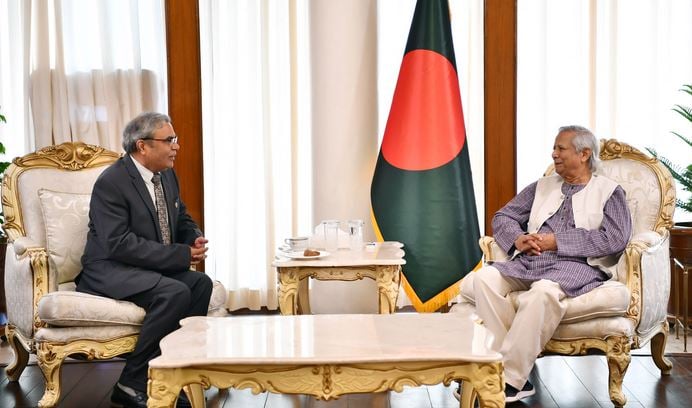
DHAKA, Oct 28, 2024 (BSS) - Chief Adviser Professor Muhammad Yunus today said BIMSTEC should focus more on youth, environment, and climate crisis issues.
He made the remark when Secretary General of the Bay of Bengal Initiative for Multi-Sectoral Technical and Economic Cooperation (BIMSTEC) ambassador Indra Mani Pandey called on him at the State Guest House Jamuna in Dhaka.
Prof Yunus highlighted the achievements of the Bangladeshi young people who led a successful revolution in July-August.
"They are the future," he said, adding that Dhaka would hold a festival for the youth shortly, and the Chief Adviser hoped each of the seven nations would send young people to join the festival in the Bangladesh capital.
The Secretary General briefed the Chief Adviser about the activities of the BIMSTEC, saying that the member nations were trying to transform it into a top active regional forum.
Ambassador Pandey said Bangladesh would take over the chair of the BIMSTEC after the upcoming summit with expectations that Professor Yunus's leadership will inject new life into the activities of the seven-nation grouping.
"We've poised to become a functionally more active organisation," Ambassador Pandey said.
"With your leadership, we will be able to make progress in many areas," he said.
Thailand was expected to hold the BIMSTEC summit in September. But it was postponed and will be rescheduled later.
Ambassador Pandey said the group has started holding three ministerial meetings a year and has signed agreements in key areas, including maritime transport and energy cooperation.
He said environment and climate change have also emerged as key priority areas of the group.
Ambassador Pandey praised the Three Zero movement launched by the 2006 Nobel Peace Laureate.
He said women centric development is also a key priority of the BIMSTEC.
Prof Yunus said among the BIMSTEC nations, Nepal alone has more than 700 Three Zero clubs, and at least eight Indian universities have set up social business hubs.